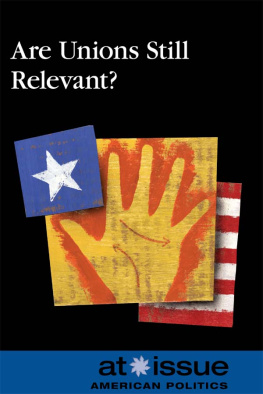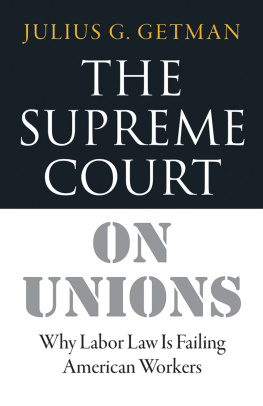The International Library of Sociology
WORKERS, UNIONS
AND THE STATE
The International Library of Sociology
THE SOCIOLOGY OF
WORK AND ORGANIZATION
In 18 Volumes
I | Apprenticeship | Liepmann |
II | Industrial Disputes | Eldridge |
III | Industrial Injuries Insurance | Young |
IV | The Journey to Work | Liepmann |
V | The Lorry Driver | Hollowell |
VI | Military Organization and Society | Andrzejewski |
VII | Mobility in the Labour Market | Jeffreys |
VIII | Organization and Bureaucracy | Mouzelis |
IX | Planned Organizational Change | Jones |
X | Private Corporations and their Control - Part One | Levy |
XI | Private Corporations and their Control - Part Two | Levy |
XII | The Qualifying Associations | Millerson |
XIII | Recruitment to Skilled Trades | Williams |
XIV | Retail Trade Associations | Levy |
XV | The Shops of Britain | Levy |
XVI | Technological Growth and Social Change | Hetzler |
XVII | Work and Leisure | Anderson |
XVIII | Workers, Unions and the State | Wootton |
First published in 1966 by
Routledge
Reprinted in 1998 by
Routledge
2 Park Square, Milton Park, Abingdon, Oxon, OX14 4RN
Transferred to Digital Printing 2007
1966 Graham Wootton
All rights reserved. No part of this book may be reprinted or reproduced or utilized in any form or by any electronic, mechanical, or other means, now known or hereafter invented, including photocopying and recording, or in any information storage or retrieval system, without permission in writing from the publishers.
The publishers have made every effort to contact authors/copyright holders of the works reprinted in The International Library of Sociology. This has not been possible in every case, however, and we would welcome correspondence from those individuals/companies we have been unable to trace.
British Library Cataloguing in Publication Data
A CIP catalogue record for this book
is available from the British Library
Workers, Unions and the State
ISBN 0-415-17695-6
The Sociology of Work and Organization: 18 Volumes
ISBN 0-415-17829-0
The International Library of Sociology: 274 Volumes
ISBN 0-415-17838-X
Publishers Note
The publisher has gone to great lengths to ensure the quality of this reprint but points out that some imperfections in the original may be apparent
Preface
The boundaries of this discussion are set by the obligations of workers in their trade (or labour) unions to the community at large, as represented by the State. I begin by summoning from political philosophy (and history) the question that, like a cry caught by a rising wind, once carried across the kingdom: why ought the citizen to obey the State? Far from being outmoded even today, that question hovers over the returning traveller as he makes his customs declaration, and haunts the young man drafted for active military service overseas. In the United States as (and where) I am writing this introduction, the draft-card burners have been acting out the great dramatic theme of modern political philosophy. Nevertheless, in the United States generally as in other favoured lands such as Britain and Canada, obedience, if neither ungrudgingly given nor ever fully articulated as deeds, can be taken for granted. There, at least, the really interesting question is not cwhy ought the citizen to obey? but rather, by what process does he learn to feel obliged to obey?
I recall, too, that traditionally the problem of political obligation has been formulated and discussed in highly artificial terms: an individual apparently enjoying few social affiliations, but for that reason suffering few conflicting loyalties, is matched against the State, almost like some friendless matador alone with an indestructible bull in an empty, silent arena somewhere remote within Space-and-Time. In the complex here-and-now, I suggest, the individual has to be conceptualized within his many social groups, each of which has some claim upon his allegiance. Thus, for various reasons, I press political obligation into service only to grant it a quick discharge from this discussion, and proceed to replace it by what we may call civic obligation. The ultimate effect of that replacement is to turn attention from man-as-citizen : State to man-in-his-various-roles : State.
From the many relationships subsumed under man-in-his-various-roles : State, I select for discussion, man-as-worker and man-as-unionist : State. I take the perspective of the ordinary worker and sketch the problem of civic obligation as it touches himthe right ordering of his several loyalties so as to give precedence to the just claims of the community, spoken for by the State (or by the Government, deemed here to be the States honest broker). I make no attempt to discuss the basis of a just claim; for arguments sake I even assume, in the illustration offered, that the particular current claim advanced by the Government is just. I concentrate rather upon the prior problem of bringing about the right orientation of the worker, the widening of the ambit of his loyalties, so that the Governments just claims could reasonably hope to receive due consideration. How might the worker learn to identify and accept such claims and to act upon them? What are the conditions under which he could be expected to recognize civic obligation and to exercise civic virtue (as we may term civic obligation excellently discharged)? I try, then, to trace the civic obligation of the worker to its sociological and social-psychological roots.
This concern of mine is in part the unexpected by-product of the researches I conducted intermittently for several years into the internal government and politics of the Draughtsmens and Allied Technicians Association (DATA), a trade union whose members occupy a strategic position in the British engineering industry and so in the British economy. For reasons that it would be as tiresome to recount as to read, I have yet to put the results of that work into book form, although I have published some preliminary findings.1 One reason, however, is immediately relevant. For some years I attended the regular meetings of DATAs National Executive Committee, a privilege accorded few professional students of any trade union since Beatrice Webb was given it some eighty years ago. As, month after month, I sat in my unobtrusive corner seat in the lounge of a Bloomsbury hotel and listened to the discussions of high-level union policy, I became more and more absorbed by questions that had not even occurred to me at the outset: how is the personality (or character) of the active trade unionist formed? What are its distinguishing features? What is the source and nature of trade-union norms (or expected behaviour)? I could not resist the temptation to read in the margins of my research subject, despite the inevitable diversion from the main task in hand.





